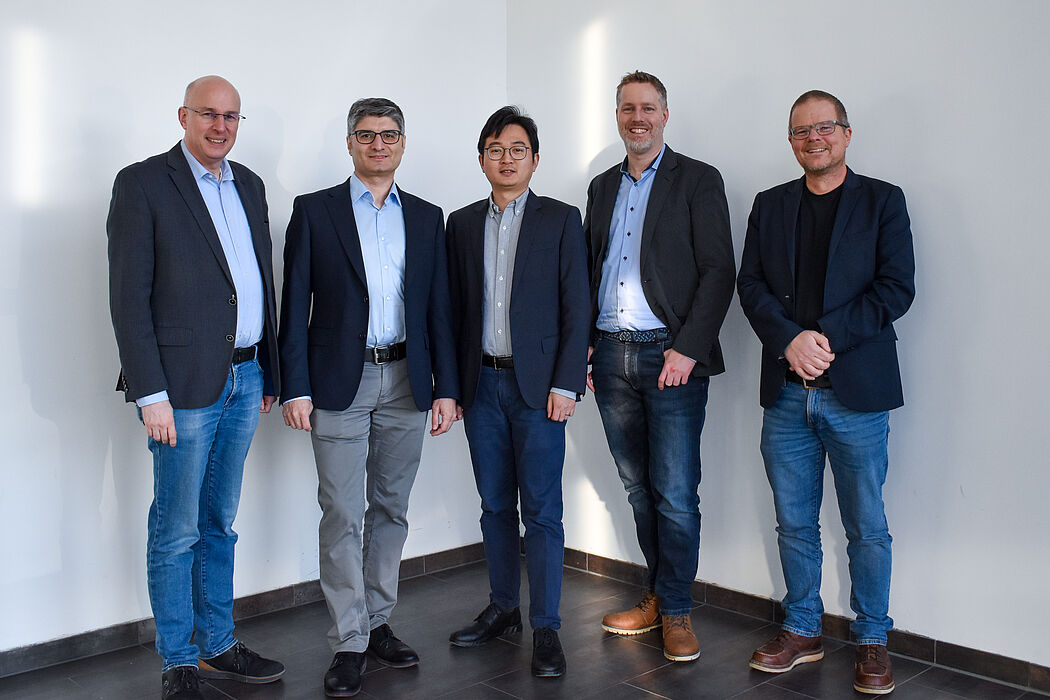Inaugural lecture by Prof. Dr Erdal Kayacan and Prof. Dr Lin Wang
On Tuesday, 21 January 2025, Prof. Dr. Erdal Kayacan (Control and Automation Engineering) and Prof. Dr. Lin Wang (Computer Networks) gave their inaugural lectures in lecture hall O2. The dean of the faculty, Prof Dr Jürgen Klüners, welcomed both professors and the audience at the beginning of the event.
The first lecture was given by Professor Dr Erdal Kayacan, who was appointed to the Institute of Electrical Engineering and Information Technology in April 2024.
Professor Erdal Kayacan completed his doctorate in the subject area of Electrical Engineering and Electronics at Bogazici University in Istanbul, Turkey, in 2011. After his postdoctoral research at the University of Leuven (KU Leuven) in Leuven, Belgium, he joined the School of Mechanical and Aerospace Engineering at Nanyang Technological University (NTU) in Singapore, where he was an Assistant Professor for four years. From 2018 to 2023, he was Associate Professor at the Faculty of Engineering at Aarhus University in Aarhus, Denmark. Since April 2023, he has been a member of the Institute of Electrical Engineering and Computer Science at Paderborn University and teaches in the field of control and automation technology. Dr Kayacan is an active member of the Computational Intelligence Society and the Robotics and Automation Society of the Institute of Electrical and Electronics Engineers (IEEE). He is also Associate Editor of the IEEE Robotics and Automation Letters.
In his lecture on "Navigating the Unknown: Tackling Uncertainty in Robot Control and Perception" , he will , after a brief philosophical introduction to determinism and predictability, get to the bottom of the challenges of uncertainty in the control, navigation and perception of autonomous ground and air vehicles. To this end, he first explains the combination of machine learning with classical control methods as a means of mastering uncertainty in robotic systems. In addition, Professor Kayacan explains the challenge of uncertainties in agile flying robots at high speed, which arise, among other things, from the large amounts of data generated. In particular, he presented event-based neuromorphic cameras that reduce not only the amount of data but also visual impairments such as motion blur and high dynamic range effects. At the end of the presentation, Prof Kayacan emphasised that resilience in robotics is crucial to ensure reliability, efficiency and long-term operation in real-world applications. Finally, he rounded off his presentation with videos of autonomous drone races and his ideas for future academic education in the field of "AI & Robotics".
Following this, Professor Dr Lin Wang explained in his presentation on "Efficient and Sustainable Networked Systems for Connected Intelligence" that innovations in the field of computer networks have focused on cloud and edge networks in recent years. In particular, advances in the underlying network infrastructures are needed to fully utilise the great potential of artificial intelligence (AI) applications. According to Professor Wang, networked systems play a crucial role here - from large data centres to the tiny Internet of Things (IoT). In the field of data centres, he discusses research topics from recent years such as in-network computing and serverless computing to support large-scale AI training and inference. In the edge field, he introduces the concept of battery-free IoT devices that autonomously harvest the energy for their operation from their environment to support edge AI inference. Finally, he explained his vision and novel concepts to address the two critical challenges of networked systems, namely efficiency and sustainability, and outlined the path to realising networked intelligence.
Professor Lin Wang received his PhD in Computer Science from the Institute of Computing Technology, Chinese Academy of Sciences in 2015. Before joining Paderborn University, he was an assistant professor in the Department of Computer Science at VU Amsterdam since December 2018. From 2016 to 2018, he worked first as a Senior Researcher and then as an Athene Young Investigator at TU Darmstadt. Before that, he spent a year as a postdoctoral researcher at SnT Luxembourg. During his PhD studies, he attended the IMDEA Networks Institute from 2012-2014. He has received several major awards, including a Google Research Scholar Award, an Outstanding Paper Award from the IEEE RTSS 2022, and three other Best Paper Awards. He is a Senior Member of the IEEE.
He joined the Institute of Computer Science in November 2023.

